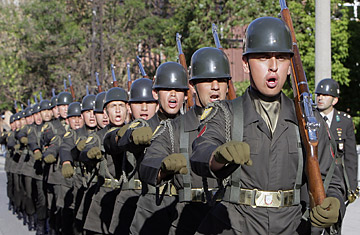
Turkish honour guard soldiers shout patriotic slogans as they process after a funeral ceremony in Ankara, Turkey.
Strike another one for Turkish democracy. Despite objections from the country's powerful generals, President Abdullah Gul approved a law on July 8 that gives civilian courts jurisdiction over crimes committed by military personnel, another step in a slow but seismic movement to trim the Turkish military's considerable influence.
The law, dubbed a "civilian revolution" by Turkish papers, is one of many reforms stipulated by the European Union, which Turkey hopes to join. "This is an important step towards democratization," says Sahin Alpay, politics professor at Bahcesehir University. "Turkey's legal system suffers from having two heads, civilian and military. This is a big step toward rectifying that."
In the mainly Kurdish southeast, scene of a two-decade war against Kurdish separatists, rights groups say the change is long overdue. "Since the 1990s, there have been many allegations of rights abuses where the chief of staff simply did not allow officers to be investigated and justice couldn't be pursued," says Sezgin Tanrikulu, a prominent lawyer in Diyarbakir. "This change is important for establishing the rule of law. You can't have one standard for everyone and another for army members."
But the law is already stirring division, with the secularist opposition deeply mistrustful of the government's motives. Critics accuse the ruling Justice and Development Party (AKP) of ignoring other E.U. reforms such as greater rights for religious minorities, Kurds or freedom of expression — YouTube has been banned in Turkey for months, for example — in favor of furthering an agenda against the military, seen in Turkey as guardians of secularism. Lurking in the background are fears that the Islamic-rooted government will eventually seek a greater role for Islam in public life.
The military is a powerful political player in Turkey and has staged four coups since 1950 against what it deemed threats to the country's secular order. As recently as 2007, it issued a veiled threat against the government's presidential nominee Gul which prompted early elections. (The government was subsequently reelected with a landslide victory.)
Polls show that Turks still rank the military the country's most trustworthy institution, but its image has taken a battering in recent months with the emergence of a shadowy network led by retired military officers. A coterie of military men, lawyers, journalists and others are accused of staging high-profile assassinations and bomb blasts over the past decade with the goal of creating unrest and a pretext for military takeover. The landmark trial is expected to last months.
That the military has not intervened in that investigation is widely seen as a sign that the top brass is keen to purge itself of hardline renegade elements.
The fate of the new law is unclear. The main opposition — staunchly secularist — says it will appeal to the constitutional court on the grounds it violates the constitution. Legal experts say that even if that is the case the constitution is a holdover from a 1980 military coup and legitimizes a political role for the military. "If we're talking about bringing Turkey in line with European norms, that constitution needs to change too," says Hasan Cemal, chief columnist for Milliyet newspaper. "The court might annul the new law based on a technical reading, but what's needed is a broad interpretation. The spirit of this new law is what counts."
A new, more democratic constitution would help meet the requirements of the E.U. process. But it would also require a broad social consensus that the ongoing battle between the government and its secularist critics makes unlikely.
